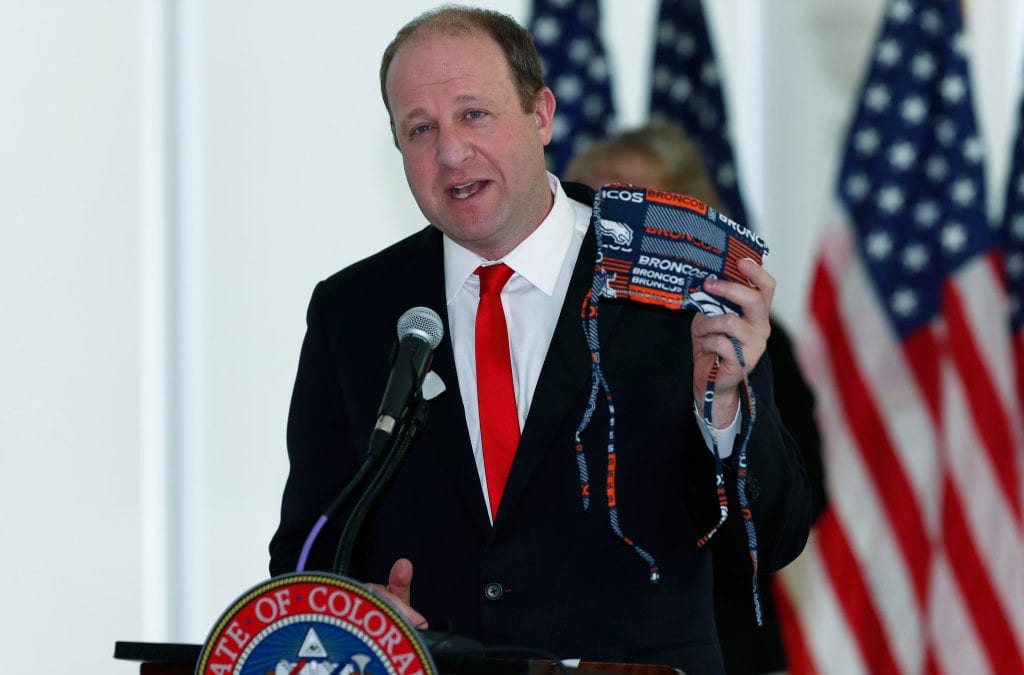Gov. Jared Polis on Wednesday defended his decision to allow some businesses to resume operations next week, saying another month under a stay-at-home mandate wouldn’t eradicate the coronavirus from Colorado — and stressing that the upcoming changes are incremental and not a return to normal life.
“We would never classify this as a grand reopening,” Polis said, likening the state’s new “safer-at-home” phase to a hike in the Rocky Mountains.
“We’re at the trailhead,” he said. “We’re not going to summit it right away.”
Denver, along with some other Colorado counties, have stay-at-home orders that extend until April 30 and supersede any less restrictive guidance from the state, which will begin easing rules on Monday.
Polis reinforced his decision to move past the stay-at-home order at a news conference Wednesday as state public health officials revealed Colorado’s coronavirus death toll has surpassed 500, and new data revealed that 64% of the state’s COVID-19 deaths are tied to nursing homes and other assisted-living facilities.
State modeling showed that another two to four weeks under the stay-at-home mandate that expires Sunday wouldn’t cause a peak in COVID-19 patients to be any less severe, Polis said. It would only push that peak down the line.
The governor also pushed back on the focus on testing for the new coronavirus, saying that while it is a crucial piece of keeping people healthy and safe during this new phase, it’s just one of four key factors — along with widespread use of face masks, protecting older and more vulnerable populations and social distancing — that will keep hospitals from being overwhelmed.
“It’s not a panacea,” Polis said of testing. “It doesn’t solve this. We can’t just test and trace our way out of this in any model.”
The state has made progress on this front, the governor announced, with 150,000 tests expected by the end of the week and 150,000 swabs expected by mid-May. The state has partnered with Colorado State University to expand testing for skilled nursing facility workers, including those who may be asymptomatic — one of the first states to do so, Polis said. Another partnership with the Gary Community Foundation is expected to bring hundreds of thousands of antibody tests.
Colorado set a goal to increase testing and tracing capacity by 5% per week during May, Polis said. The state is currently testing only 39 people per 100,000 residents each day — a jump up from recent days, but far below the 152 tests per 100,000 deemed necessary by public health officials to actively monitor the virus.
The governor on Wednesday reiterated the timeline for the shift from a stay-at-home mandate to a “safer at home” way of living, expressing time and again that people still need to wear masks, practice social distancing and work from home if possible. More extensive guidelines for specific industries — such as education, child care, real estate, retail and personal services — will be announced in the coming days.
“I know everybody’s chomping at the bit,” Polis said, “but it’s very important to get this right. We are charting new ground.”
Beginning Monday, retailers not under stricter orders like those in Denver would have the option to reopen with curbside pickup, with the ability for some to open to limited numbers of in-store customers on May 1. Personal service providers and elective medical providers, including hair salons, dental offices and tattoo shops, could reopen with some social-distancing precautions on Monday as well.
On May 4, offices will be able to reopen with half of their workforces, Polis said, even as he urged companies to continue with telecommuting as much as possible, particularly with older employees. Gatherings will be limited to 10 or fewer peopler.
Restaurants and bars will remain closed to in-person service until at least mid-May, Polis said, though he has indicated that date may change. Gyms and spas will stay closed, while schools will remain online-only until at least the fall.
As the state slowly reopens, deaths from the novel coronavirus continue to mount. At least 508 people have died of complications related to COVID-19. At least 859 people are currently hospitalized with confirmed COVID-19 infections, while 218 patients are being investigated for the illness, according to state data. At least 73 people since Tuesday either went home or were transferred to a lower level of care, like a rehabilitation facility.
More than 10,800 people have tested positive for COVID-19, though health officials say total cases are likely closer to 65,000 or 75,000.
This content was originally published here.

